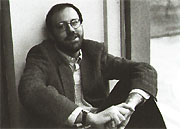
Spring
1998
![]()
![]()
Soundings is a publication of the School of Humanities and Social Science at MIT
Comments and questions to www-shss@mit.edu
All over the map
 Michael
Kremer's signature style has eclectic written all over
it. Associate Professor of Economics — and a recent recipient of
a MacArthur Fellowship, the coveted "genius" award — Kremer's
work runs a quirky gamut, ranging from complex mathematical models of
developing economies to elephant poaching and patent buyouts. "I
guess I've always liked somewhat unconventional ideas," says
the economist, adding that "it's important to be able to pursue
stupid ideas, because you never know — some may turn out to be good,
even if they sound a bit crazy at first."
Michael
Kremer's signature style has eclectic written all over
it. Associate Professor of Economics — and a recent recipient of
a MacArthur Fellowship, the coveted "genius" award — Kremer's
work runs a quirky gamut, ranging from complex mathematical models of
developing economies to elephant poaching and patent buyouts. "I
guess I've always liked somewhat unconventional ideas," says
the economist, adding that "it's important to be able to pursue
stupid ideas, because you never know — some may turn out to be good,
even if they sound a bit crazy at first."
His colleagues put a more laudatory spin on Kremer's penchant for the unconventional. "Michael has shown tremendous creativity," says MIT Economics Professor Olivier Blanchard. "His angle has always been to use very simple theory to look at points in a different way. He has insights no one had before and he has done it time and time again."
Take elephants and rhino. Kremer argues that anticipating a scarcity of tusks and horns in the future — which would lead to a hike in prices and therefore a hike in poaching — would result in a self-fulfilling expectation of extinction. Governments with credibility could implement an endangered species law, promising to spend whatever it takes to protect endangered animals from extinction. But for governments that don't have credibility, the expectation of extinction suggests an ironic, counter-intuitive public policy conclusion. "In some circumstances, it may make sense for a government to stockpile rhino horn, and then threaten to release it onto the market if rhinos look like they're becoming extinct," Kremer explains. "It's more credible for the government to threaten to sell stockpiles than to promise to spend a lot on game wardens to implement tough anti-poaching measures."
Kremer's interest in elephants developed when he spent time in Africa in the mid-1980s. Between receiving an AB in social studies from Harvard University in 1985 and earning his PhD in economics from the same institution in 1992, Kremer went on vacation to Kenya. While touring a small village, he was told to appear at the office of the local government chief. "I thought I was in trouble," he relays. Instead, he was asked to teach in a newly established school. The only foreigner in the school, and frequently the only teacher, Kremer stayed a year teaching math, physics, and chemistry. When it came time to leave, Kremer wrote to his dorm at Harvard asking if anyone would be interested in replacing him. The response was impressive, leading him to found WorldTeach, an organization linking the demand for teachers in the developing world with volunteers. The organization, which Kremer now serves as a member of the board, has offices in 10 countries.
These days, Kremer straddles arenas both theoretical and applied. "I like developing mathematical models to answer a variety of economic questions," he says, "but I would hope my research will be useful in the real world." With that aim, he remains involved in educational programs in Kenya. Working with the Dutch non-profit organization Internationaal Christelijk Steunfonds, for example, he will be evaluating the impact of textbooks on exam scores in Kenyan schools, dedicating a portion of his MacArthur award — $215,000 over five years — to support the project.
Winning the MacArthur has had a modest impact on his life, says Kremer. "Mostly, it's made me busier, because with more money for projects, I'm hiring more research assistants. But sometimes I wish I had more time to just shut myself in a room and do more of my own research, by myself." The ‘genius' label elicits a shrugging reaction from him. "It doesn't make much difference within the economics profession, because my colleagues know better than that," he says. In one area, however, it has made a difference. "My parents were impressed."
Copyright © 2000 Massachusetts Institute of Technology